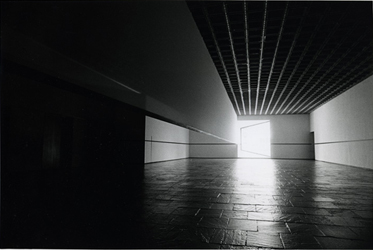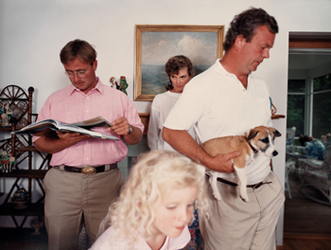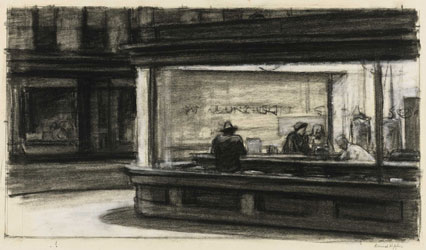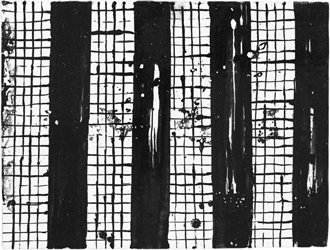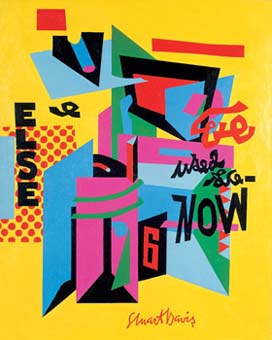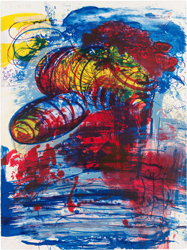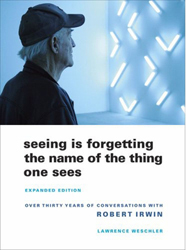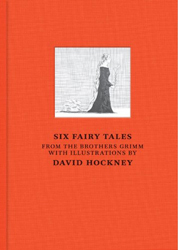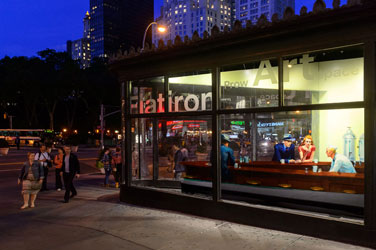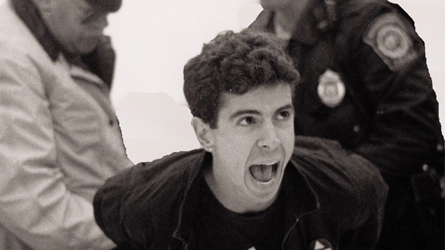#relacoespublicas #rp #rpmoda #pr #publicrelations » 2013 Agosto 29 » Robert Irwin, David Hockney & I, YOU, WE Close Sunday
21:53 Robert Irwin, David Hockney & I, YOU, WE Close Sunday | |
Don’t miss these acclaimed exhibitions, all closing this weekend: Robert Irwin's Scrim veil—Black rectangle—Natural light, Whitney Museum of American Art, New York, "one of the masterpieces of Light and Space, or Minimalism in general" (The New York Times); I, YOU, WE, which explores how artists negotiated the personal and collective politics of the 1980s and early '90s; and David Hockney: The Jugglers, the U.S. premiere of Hockney’s first video installation.
We hope to see you at the Whitney! ROBERT IRWIN: SCRIM VEIL—BLACK RECTANGLE—NATURAL LIGHT, WHITNEY MUSEUM OF AMERICAN ART, NEW YORK (1977)
Through September 1
Scrim veil—Black rectangle—Natural light, Whitney Museum of American Art, New York
(1977), by Light and Space artist Robert Irwin, has not been exhibited
since its 1977 debut—a pivotal moment that set the course for Irwin’s
subsequent practice. Made specifically for the Museum’s fourth floor,
the large-scale installation engages the Whitney’s iconic Breuer
building and the light emanating from the gallery’s oversize window.
This is a unique opportunity to view a work that, per the artist’s
direction, may be shown only in this setting.
"I,"
"you," "we": three very commonplace words. These pronouns—with all
their implied complexities of meaning—provide an unexpected guide for
assessing works of art from the 1980s and early '90s by artists like
Robert Mapplethorpe, Nan Goldin, and Felix Gonzalez-Torres, among
others. What becomes apparent in this survey of paintings, sculpture,
drawings, prints, and photographs is how the personal, social, and
collective issues and concerns of the artists of this time are still
relevant several decades later.
DAVID HOCKNEY: THE JUGGLERS Through September 1
This exhibition marks the U.S. premiere of David Hockney’s first video installation, The Jugglers, June 24th 2012
(2012). Filmed by eighteen cameras, a group of jugglers make up a
vibrantly kinetic composition as they move across a grid of eighteen
screens, accompanied by a lively musical soundtrack. The multiple
perspectives place the choice of where to look with the viewer,
demonstrating the artist’s exploration of technology’s ability to open
up new ways of looking at, and making, images.
HOPPER DRAWING
Through October 6
Hopper Drawing
is the first major exhibition to survey the drawings and working
process of Edward Hopper (1882–1967), pairing many of his iconic oil
paintings, including New York Movie (1939) and Nighthawks
(1942), with their preparatory studies and related works. Hopper’s
drawings reveal the continually evolving relationship between
observation and invention in the artist’s work, and his abiding interest
in motifs— New York’s urban fabric, the movie theater, the bedroom, the
road—to which he would return throughout his career.
TEST PATTERN
Through December 1
Test Pattern
includes a selection of recent acquisitions by young and emerging
artists that have entered the Museum’s collection in the past four
years. Using a diverse range of media and processes, the artists in this
exhibition relay information by manipulating surfaces, narratives, and
images. By encouraging us to sift through layers of visual information,
their works point to nuanced ways of understanding our physical and
visual landscape.
American Legends: From Calder to O’Keeffe
showcases the Whitney’s deep holdings of artwork from the first half of
the twentieth century by the eighteen leading artists: Oscar Bluemner,
Charles Burchfield, Paul Cadmus, Alexander Calder, Joseph Cornell,
Ralston Crawford, Stuart Davis, Arthur Dove, Charles Demuth, Marsden
Hartley, Edward Hopper, Gaston Lachaise, Jacob Lawrence, John Marin,
Reginald Marsh, Elie Nadelman, Georgia O’Keeffe, and Joseph Stella. One-
and two-artist presentations provide a survey of each artist's work
across a range of media.
IN PARTS Ongoing
Artists
frequently think beyond the unique object, choosing to work with a
group of closely related images that together express an artistic vision
in its entirety. This ongoing installation, drawn from the Museum’s
extensive holding of works on paper, presents examples of this creative
process. Works by Dotty Attie, Mark Bradford, Carroll Dunham, Dan
Flavin, Jasper Johns, Elizabeth Murray, Lorna Simpson, Joyce Trieman,
and Terry Winters, among other artists, will be shown in rotation.
SEEING IS FORGETTING THE NAME OF THE THING ONE SEES (EXPANDED EDITION)
Seeing Is Forgetting the Name of the Thing One Sees chronicles three decades of conversation between author Lawrence Weschler and light and space master Robert Irwin.
SIX FAIRY TALES FROM THE BROTHERS GRIMM WITH ILLUSTRATIONS BY DAVID HOCKNEY
Reprinted
for the first time since its original publication in 1969, David
Hockney’s illustrations for the tales of the Brothers Grimm reimagine
these strange and supernatural stories for a modern audience. A HOPPER-INSPIRED POP-UP AT
THE FLATIRON BUILDING
Through October 6
In celebration of Hopper Drawing, a life-size window installation of Edward Hopper’s Nighthawks (1942) is on view inside the landmark Flatiron Building's prow, one of the original architectural inspirations for this iconic painting. THE NEW-YORK HISTORICAL SOCIETY SCREENS: HOW TO SURVIVE A PLAGUE
Tuesday, September 3
170 Central Park West at Richard Gilder Way (77th Street)
I, YOU, WE
considers how personal, social, and collective issues faced by artists
in the 1980s and early 1990s—including HIV/AIDS—continue to resonate
today. On September 3, the New-York Historical Society and filmmaker
David France will screen How to Survive a Plague, which
explores how a group of HIV/AIDS activists creatively defied the
establishment to advance medical trials and treatment for millions.
by #Whitney Museum of American Art | |
|
| |
| Total de comentários: 0 | |



